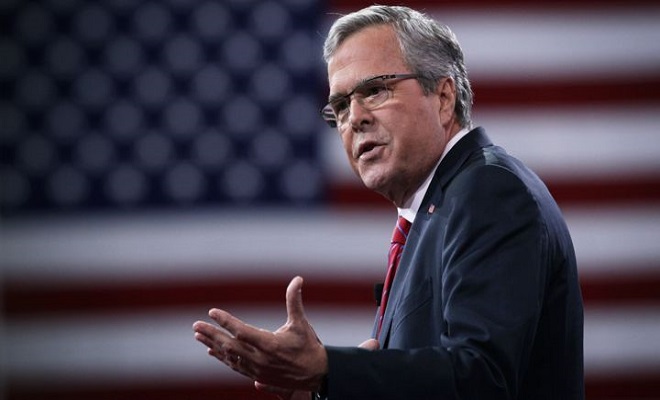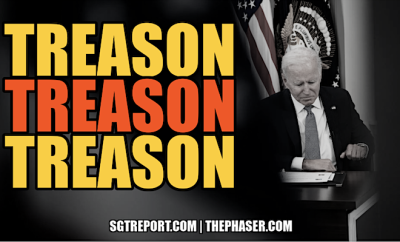 Would Jeb Bush have invaded Iraq like his brother, George W.? His stumble to answer lit a media frenzy. Would Jeb Bush have invaded Iraq like his brother, George W.? His stumble to answer lit a media frenzy. Alex Wong/Getty
Would Jeb Bush have invaded Iraq like his brother, George W.? His stumble to answer lit a media frenzy. Would Jeb Bush have invaded Iraq like his brother, George W.? His stumble to answer lit a media frenzy. Alex Wong/Getty
Featured
Forget What We Know Now: We Knew Then the Iraq War Was a Joke
by Matt Taibbi, Rolling stone.com:
So presidential hopeful Jeb Bush is taking a pounding for face-planting a question about his brother’s invasion of Iraq. Apparently, our national media priests want accountability from leaders on this issue.
One of the first “gotcha” moments of the 2016 presidential race came about as follows: Reporters following Jeb Bush on a pre-announcement campaign tour smartly decided to badger him about his position on the Iraq invasion. “Knowing what he knows now,” they asked, would he have done the same thing as his brother?
Jeb’s answer was characteristically Bushian: yes, no, and maybe. Bush III somehow hadn’t prepared for the one question he was most absolutely certain to face the moment he decided take a step in the direction of the White House.
It was a little bit like invading a country and having no plan at all for what you do after you seize the capital. In other words, the kind of thing that should disqualify a person not just from the presidency, but maybe also from having a driver’s license. George W. specialized in these jaw-dropping oversights, and it seems his brother might have a similar talent.
Over the course of four or five very painful days Jeb pushed his Iraq position all over the board. First he said yes, he would have done the same thing as his brother (and so would have Hillary Clinton, he pointed out). Then he said he misunderstood the question. Then he said that even answering the question would dishonor the troops (which I thought was an impressively clever and Rove-ian response!).
Head by now turned all the way around, in the fashion of nature’s magnificent owl or Linda Blair, he finally told Fox’s Megyn Kelly, “Knowing what we know now. . .I would not have engaged. I would not have gone into Iraq.”
It was a no-win question for Jeb. He had two choices with this question: either send his brother up the river or set himself up for a general election campaign wearing a position that polls say could hurt him with 70 percent of voters.
The media quickly piled on. “Jeb Bush’s Iraq Stumble” was the title of the Wall Street Journal’s “Journal Editorial Report” on Fox. “On Iraq Question, Jeb Bush Stumbles and GOP Hopefuls Pounce,” countered the Washington Post.
“Jeb Bush’s Revisionist History of the Iraq War,” wrote New York Times Editorial Page editor Andrew Rosenthal. “Yeah, Jeb Bush’s argument that the Iraq War was right even in retrospect is insane,” tweeted current New York and erstwhile New Republic writer Jonathan Chait early in the story cycle, when Jeb was still defending the war.
A few writers, like Steve Chapman at the Chicago Tribune, criticized Jeb for not disavowing the “reckless adventurism” of the Bush II era that led to the war in the first place. In other words, Chapman blasted Jeb for being wrong then and now.
But the substance of most of the media mockery in the last week was to whale on Jeb for not admitting quickly enough that the war, in hindsight, given “what we know now,” was a huge mistake.
We can call this the “None of us pundits would have been wrong about Iraq if it wasn’t for Judith Miller” line of questioning. This rhetoric goes something like this: since we invaded, the war has gone epically FUBAR, so it’s obvious now that it was a mistake, and so we can mock you for not admitting as much.
But because of Judith Miller, it wasn’t obvious even to all of us geniuses back then, which is why virtually every media outlet to the right of Democracy Now! (MSNBC included, as old friend Alex Pareene wittily pointed out) got it wrong for years on end, back when this issue actually mattered.
Go back up a few paragraphs and look at that list of media outlets. All of them – the Washington Post, the Wall Street Journal, the New York Times obviously, the Chicago Tribune – they were all card-carrying Iraq war cheerleaders.
I get that many of the individual writers involved in bashing Jeb this week were not the same writers who whored for the Bush administration back in the day. (Although some of them were. Chait in March of 2003 went on Hardball and told the world, “I don’t think you can argue that a regime change in Iraq won’t demonstrably and almost immediately improve the living conditions of the Iraqi people.” And Rosenthal, of course, was Judith Miller’s editor.)
But the individuals aren’t the issue. It’s the general notion that the Iraq War issue was some kind of tough intellectual call that we all needed hindsight to sort out. It wasn’t, and we didn’t.
It was obvious even back then, to anyone who made the faintest effort to look at the situation honestly, that the invasion was doomed, wrong, and a joke.

Do people not remember this stuff? George Bush got on television on October 7th, 2002 and told the entire country that Saddam Hussein was thinking of using “unmanned aerial vehicles” for “missions targeting the United States.”
Only a handful of news outlets at the time, most of them tiny Internet sites, bothered to point out that such “UAVs” had a range of about 300 miles, while Iraq was 6,000 miles from New York.
What was the plan – Iraqi frogmen swimming poison-filled drones onto Block Island?
This fantasy was silly when the scare story was Red Dawn and our enemy was the technologically advanced Soviet Union. But to have the president of the United States trot that one out about busted-down Iraq in a national address, and not have him immediately pilloried by the entire national press corps, was incredible.
The Iraq invasion was always an insane exercise in brainless jingoism that could only be intellectually justified after accepting a series of ludicrous suppositions.
First you had to accept a fictional implied connection between Saddam Hussein and 9/11. Then you had to buy that this heavily-sanctioned secular dictator (and confirmed enemy of Islamic radicals) would be a likely sponsor of radical Islamic terror. Then after that you had to accept that Saddam even had the capability of supplying terrorists with weapons that could hurt us (the Bush administration’s analysts famously squinted so hard their faces turned inside out trying to see that one).
And then, after all that, you still had to buy that all of these factors together added up to a threat so imminent that it justified the immediate mass sacrifice of American and Iraqi lives.
It was absurd, a whole bunch of maybes piled on top of a perhaps and a theoretically possible or two. O.J.’s lawyers would have been embarrassed by it.
I don’t believe that most of the otherwise smart people who supported the war back then, from Hillary Clinton to the editorial boards of our major newspapers, bought any of this. What did happen is that a lot of people got caught up in the politics of the situation and didn’t have the backbone to opt out. They didn’t want to look weak, un-American, or “against the troops,” at least not in public, so they sat out the debate and got behind the president.
That’s why the lambasting of Jeb Bush by all of these media voices grinds a little. At least plenty of Republicans sincerely thought the war was a good idea. But I know a lot of my colleagues in the media saw through the war from day one.
The bulk of them hid behind the morons in our business, people like Tom Friedman and David Brooks and Jeffrey “I trusted the Germans” Goldberg, frontline pundits who were pushed forward to do the dirty work, the hardcore pom-pom stuff.
Many others, particularly the editors, quietly sat by and let lie after lie spill onto their papers’ pages, telling themselves that this wasn’t wrong or a mistake until years later, when we found out for sure the WMD thing was a canard.
Now a lot of these same people are green-lighting stories about how wrong Jeb Bush is for not admitting to what is at last obvious, “knowing what we know now.” But forget what we know now. We knew then, but we’re just not admitting it.

















